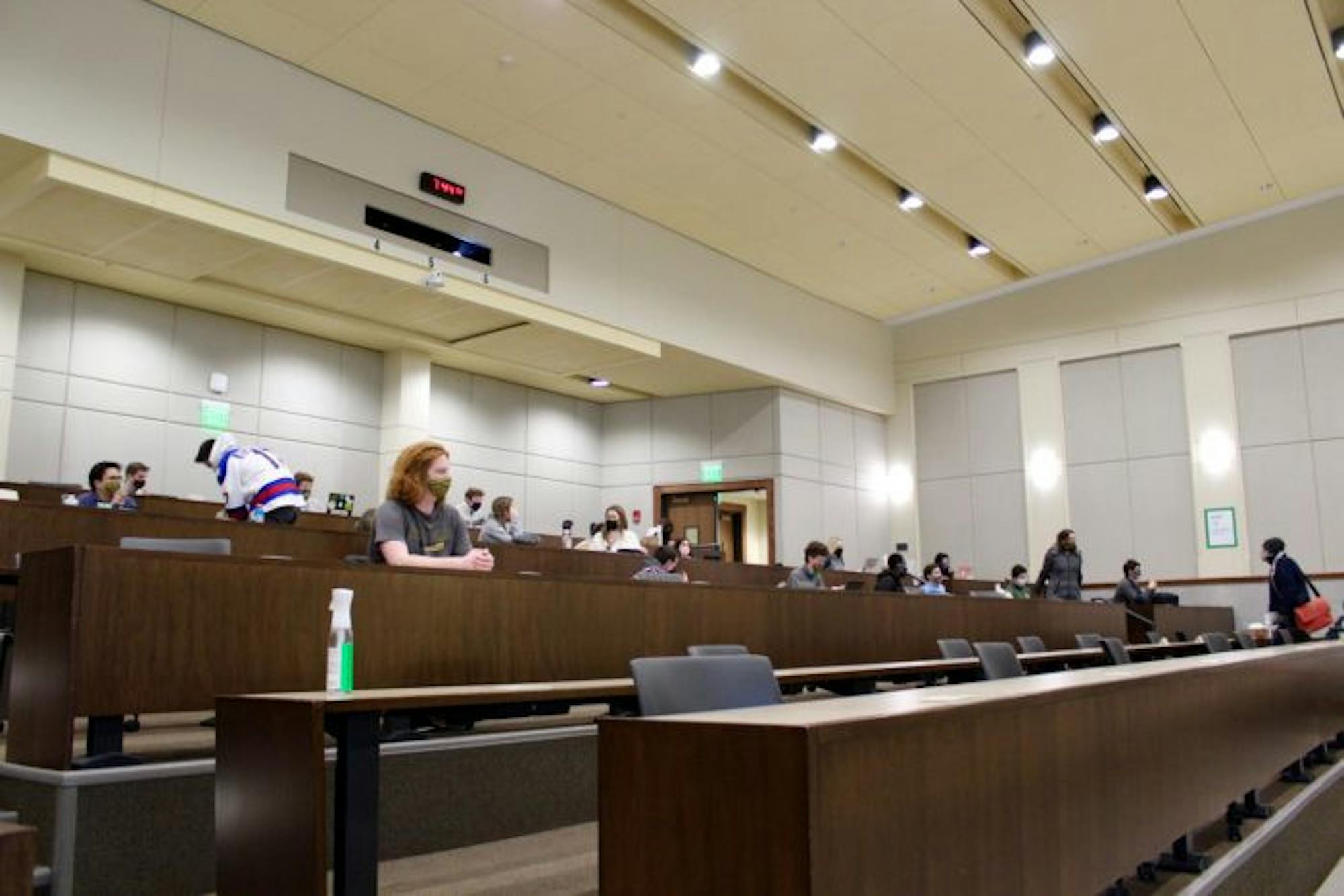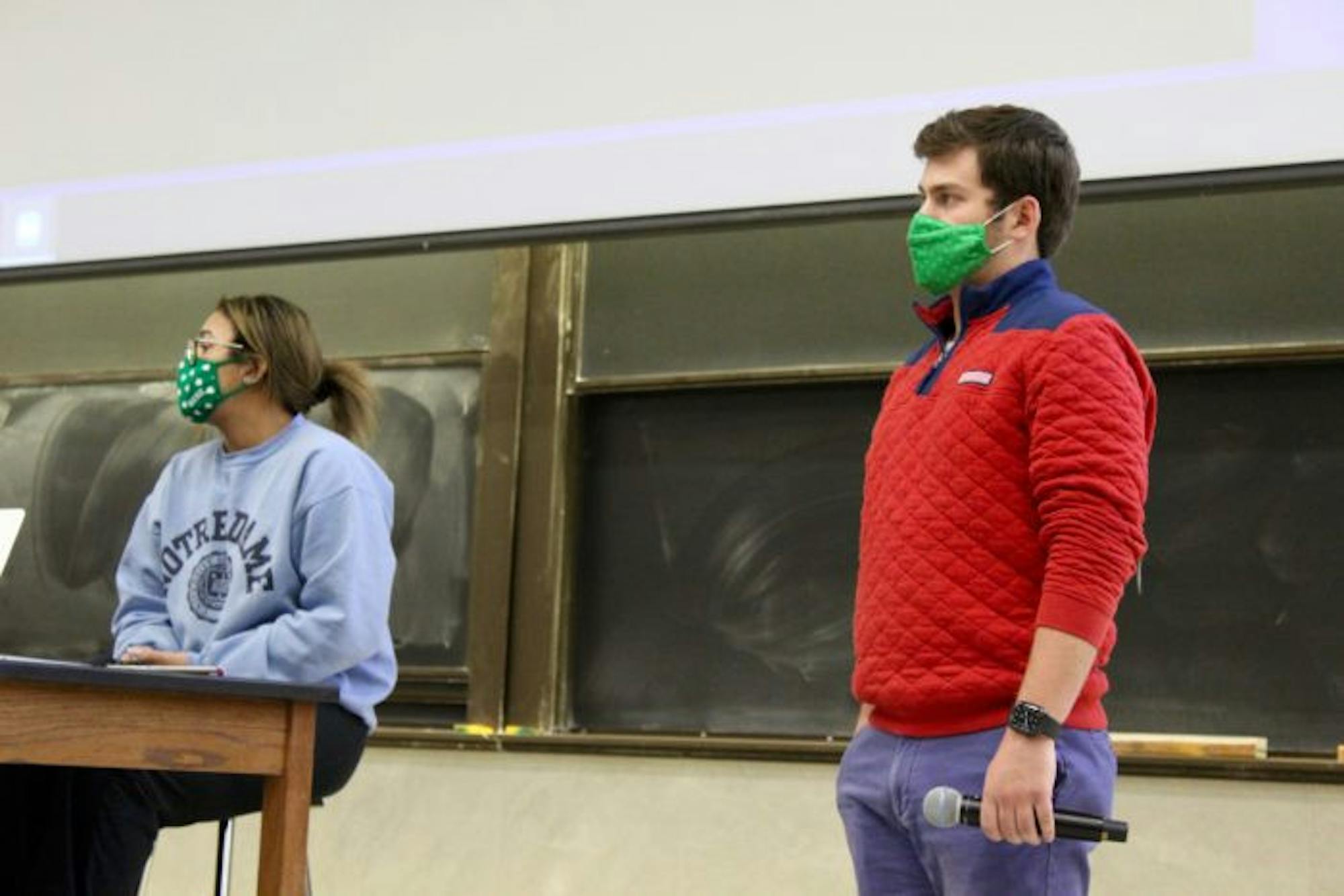The Notre Dame student senate convened Wednesday evening during an agenda-rich meeting. As the night progressed, this student government branch approved two orders, debated procedures pertaining to the forthcoming student body presidential race and culminated with the distribution of sweaters described by senior student body vice president Sarah Galbenski.
Once Baumer Hall senator, first-year Daniel Schermerhorn, delivered the opening prayer, the chamber unanimously voted to suspend vacancy elections in Keough and Johnson Family Halls, as vice-presidential candidate, Patton Meacham, and senatorial hopeful, Eliza Smith, were running unopposed in their respective dorms.
The issue of officials vacating their positions is one that the pandemic has brought upon since last semester. Newly-instituted Judicial Council President, junior Thomas Davis, said the “difficult” and unprecedented semester had encumbered office-holders in different ways.
“Last year when people signed up for the role of senator or president, etcetera, no one knew what to expect once we got to this point,” Davis said. “So we have to respect if people are overwhelmed — we want our senators to be representing people fully. There are also a lot of schedule changes, and some can’t come to meetings.”
Consequently, Smith was sworn into office and a round of applause ensued.
The next order of business was to discuss an order sponsored by the student body parliamentarian, sophomore Madison Nemeth, proposing to conduct a referendum in order to gauge student opinion on the number of signatures necessary to refer a petition to the senate.
‘Our standard is extremely low’
Article XIV, Section 1(a) of the Student Constitution states that in order for a petition to be brought forth to the senate it must garner “the valid signatures of 200 members of the undergraduate student body.”According to Nemeth, this number is “extremely low,” as it represents less than 3% of the current student body. She said that in other peer institutions, like Washington University, Baylor University and Duke University, 5%, 10% and 15% respectively are necessary to do the same.
“We believe that 200 signatures is just not a substantial amount of the student body to truly reflect the will of the student body as far as petitions go,” Nemeth said.
Despite asserting the need to increase the number of signatures, Nemeth said the Judicial Council had ultimately decided to recommend the establishment of a referendum in order to allow greater student involvement in the decision.
“I think it’s important that, if we’re altering the right of the undergraduate students, to ask them about that,” Nemeth said. “This is our attempt to be as democratic as possible in raising that standard.”

A lively debate went on for approximately 30 minutes, as the senators and Judicial Council officials discussed the pros and cons of enacting the referendum. Concerns were raised about possibly suppressing minority views with this move.
“Three percent is small, I agree, but it’s not totally insubstantial,” sophomore Henry Jackson, the senator from Keenan Hall, said. “If you raise the number, you’ll make it harder for the students to have their voice heard.”
Nevertheless, Nemeth and Davis said the aim is to optimize the legislative process.
“There have been petitions that have had insignificant — that’s the best way I can think of right now — number of signatures, and it failed in the senate,” Nemeth said. “Petitions that have had a higher number of signatures have been more successful being passed. So I guess that’s kind of the rationale.”
“The standard is so low it immediately forces the student senate to talk about it within one week,” Davis said. “Like you guys have things to do, so whenever there’s some sort of constitutional bar that says you must do this in a week, it really slows down business.”
Davis also added that senatorial responsibilities include representing minorities.
“If there is a minority voice, or if there is something that less than 200 students on an 8,600-student campus, believe in that should go to the senate, they should go talk to you,” Davis said. “That’s why you’re here. Your job is to represent your residence halls. So if there’s something that three people in your residence hall believe in, they should come talk to you.”
While senators considered having the referendum, they proposed raising a cap in the number of signatures and debated how the “yes” or “no” question should be posed to students to allow for greater transparency — some considering a set amount should be established while others preferring a range of percentages.
Ultimately, compromise was achieved when 70% of all senators voted to determine the student body’s opinion via a referendum that will ask whether they agree to raise the number of necessary signatures “with the addition of 5 to 8% to give students more clarity,” Galbenski announced.
However, this was not the evening‘s final debate.
“It seems like we‘re beating a dead horse”
After Galbenski briefly described next week’s agenda, Dunne Hall senator, sophomore Michael Murakami, voiced concerns brought upon by some of his constituents about petitioning practices for the upcoming student government election.Friday is the deadline for hopeful tickets to solicit the required 700 signatures to begin officially campaigning. Murakami pointed out that students had complained about not having “ample communication with people” and other petitioning limitations due to the ongoing pandemic.
Davis recognized that there were significant issues with the petitioning process, as students are unable to garner “pen and paper” signatures in the dining halls. He also said there were two options: either to suspend petitioning completely or extending some of the tickets’ timeframes.
“There is a clause in the constitution that allows us to extend the petitioning period for those that cannot make the deadline for various circumstances through the election committee,” Davis said. “And that is on a case by case basis — with written approval.”
However, director of Student Activities, Karen Kennedy, had a word of warning against altering the existing protocols.
“When you change the rules in the middle of the race, you have people who started in the way that they were, and if we change the rules in the middle, it can feel unfair to those who were playing by the original rules,” Kennedy said. “So it is not something that I think ever should be done lightly.”
Freshly-installed Smith weighed in on the hardships students could face during COVID-19, especially as Judicial Council regulations on communications leave them with “very limited opportunities” to garner support.
“Communication is limited and it’s hard for a group of individuals to reach 700 people and that include things such as social media,” Smith said. “You have an issue of people not reading certain captions or posts, but also spreading those posts with people who they don't already follow.”
Zahm House senator, sophomore Henry Bates, said it perhaps would not be prudent to have students petition in face of increasing COVID-19 cases on campus.
“One thing that stood out to me is the personal interaction nature of petitioning,” he said. “I think that if we’re going to still encourage students to get to the 700 signature number by Friday, I don’t know that that is the best idea, especially considering the rise in our COVID cases, to encourage people to go out and get so many more signatures over the next few days.”
Despite the lengthy deliberation, no official resolution resulted from it. To entertain the issue, the senate would have required unanimous consent. Noticing the lack of agreement, Alumni Hall senator Dan Baudendistel remarked “it seems like we’re beating a dead horse.”
“This is an example of a constitutionally mandated stipulation as to the number of signatures required,” Davis said. “You don’t have to do anything. It just initiatives you should talk about because it is relevant.”
As it stands, the Elections Committee will review petitioning tickets and grant them an extension, if they deem it to be appropriate.













